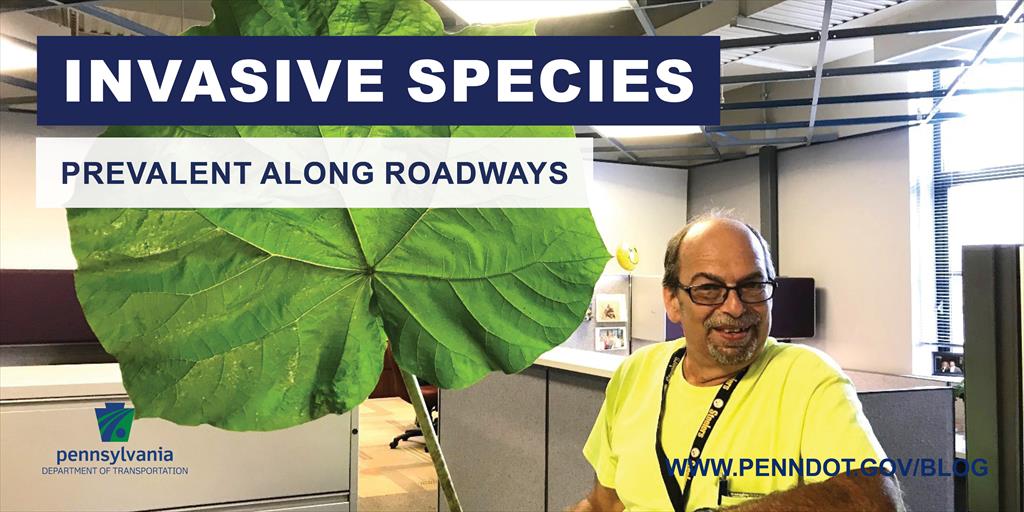
Jim Cessna — roadside specialist and professional arborist in PennDOT’s Harrisburg-area District 8 —deals with a lot of vegetation issues along our state roads, especially invasive and noxious plants and bugs.

Cessna recently shared his latest find – a huge leaf from a princess tree found along Route 225 on top of Peters Mountain in Middle Paxton Township, Dauphin County. The princess tree — also called an empress tree, foxglove tree, or more formally as a Paulowina tomentosa — is a deciduous tree native to central and western China. It is an extremely fast-growing tree and is a persistent exotic invasive plant in North America. It was introduced to America in the 1840s. A Dutch botanist, who found the tree in China while working for the Dutch East India Co., named it after a Romanov princess, the Grand Duchess Anna Pavlovna of Russia.
Cessna discovered the plan after being contacted by a concerned citizen who reported it as giant hogweed, which is also an invasive plant classified as a noxious weed. He discovered that it was a princess tree instead. It can grow to between 32 and 83 feet tall.
Invasive species represent one of the most significant ecological threats of the 21st century. Invasive species are exotic plants and animals that have been intentionally or accidentally introduced into native ecosystems. These invasive species displace native species and change the ecological structure of the invaded community, sometimes with dire consequences to native plants and animals.
PennDOT has taken the initiative to address invasive species within its rights-of-way by preparing guidance for its staff, as well as contractors working for the department, to help them address invasive species throughout the life of a project from design, through construction, and finally continuing ongoing maintenance.
To report giant hogweed, use the toll free hotline: 1-877-464-9333. To report bad bugs, contact the Pennsylvania Department of Agriculture at 1-866-253-7189 or badbug@pa.gov. To report other invasive species, contact PDA at 717-772-5225.
ABOUT THIS BLOG
Did you know PennDOT is directly responsible for nearly 40,000 miles of highway and roughly 25,000 bridges? We oversee programs and policies affecting highways, urban and rural public transportation, airports, railroads, ports and waterways, in addition to administering the state's more than 11 million vehicle registrations and 8.8 million driver's licenses.
So, how do we do what we do? And how can we help you travel in Pennsylvania — whether it be for business or leisure — in safe and enjoyable manner? Read PennDOT Way to learn more about the department, what we do, and how and why we do it.
TAGS
50-Year Anniversary, 511PA, Aggressive Driving, Airports, Autonomous Vehicles, Bicycles, Bridges, Child Safety, Community Relations, Construction, COVID-19, Distracted Driving, District 1, District 10, District 11, District 12, District 2, District 3, District 4, District 5, District 6, District 8, District 9, DOTcom, Driver and Vehicle Services, Emergency Responders, Employment, Equity, FAQ Friday, Human Trafficking, Impaired Driving, Innovations, Live Free Ride Alive, Maintenance Monday, Motorcycles, Older Drivers, PA Motorcycle Safety Program, Pedestrians, PennDOT Connects, Ports, Public Transit, Railroads, REAL ID, Road MaP, Roadside Beautification, Rural Roads, Safety, School Buses, Seat Belts, State Transportation Innovation Council (STIC), Sustainability, Teen Drivers, Throwback Thursday, Transportation Funding, Travel in PA, Welcome Centers, Winter, Work Smart, Work Zone, Yellow Dot
LATEST POSTS
PennDOT Continues Sharing, Updating Resources for Local Governments to Pursue Bipartisan Infrastructure Law Funding Opportunities
Norwin High School Wins 2024 ‘Innovations Challenge’
Demo Complete: I-95 CAP Project in Center City Philadelphia
PennDOT Archeologist Connects Past, Present, and Future
Lehigh Valley DUI, Highway Safety Task Force Hosts Law Enforcement Seminar
ARCHIVES
2024
2023
2022
2021
2020
2019
2018
2017

